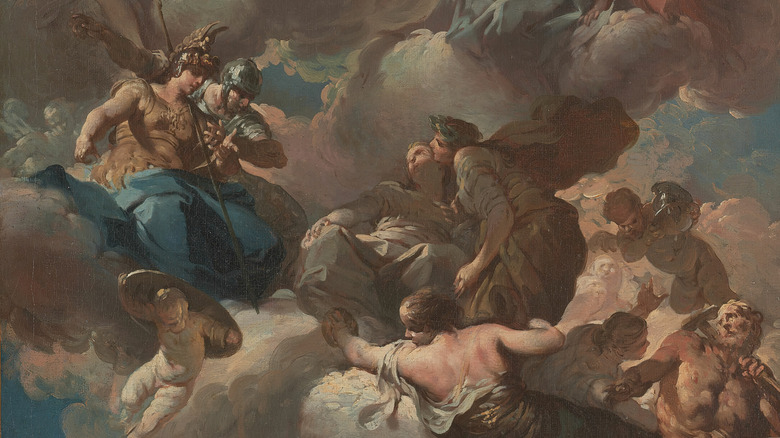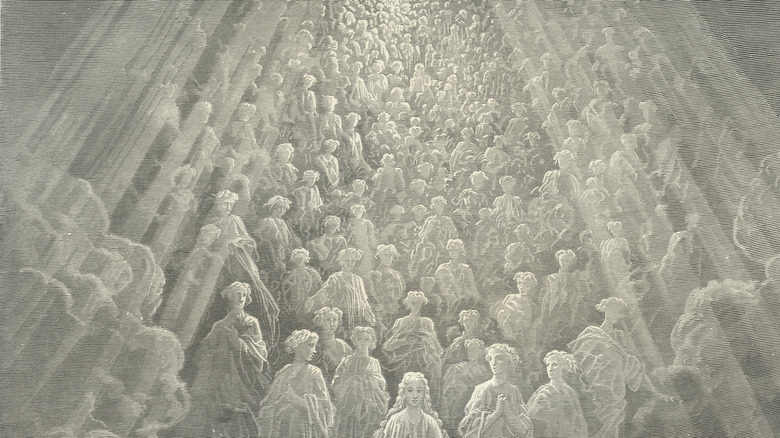Why Some People Believe There Are Different Levels Of Heaven
Heaven: even if you don't believe in it, you have to concede that the idea of never-ending paradise has an obvious appeal. Of course, there's always the question of what never-ending paradise looks like. Is it a blue sky where everyone gets white robes, wings, halos, and their own fluffy cloud? Is it personalized by our imagination, a la "What Dreams May Come?" Or is it Eric Cartman's prediction of "eternal bliss, divine rest, and $10,000 cash" (via YouTube)?
If you're looking to the Good Book to answer that question, you may be disappointed. The Bible doesn't have much to say about either heaven or hell. In the earliest Jewish traditions, there wasn't any conception of an afterlife, and the one that gradually developed into one of divine justice — that God would raise the dead, establish an earthly paradise for believers, and destroy the wicked. Thus, there's very little in the Old Testament about life after death. The words of Jesus in the New Testament indicate a similar conception of reward and punishment. The influence of ancient Greek theories of immortal souls appears to have influenced later Christians in their conception of eternal planes of paradise and punishment.
But then there is 2 Corinthians of the New Testament, wherein Paul the Apostle relates a story about how he, a "man in Christ," was "caught up to the third heaven" (via Bible Gateway). It's a brief anecdote, all of three sentences. But it's encouraged some to conceive of heaven as a many-tiered plane, with different experiences at each level.
Non-biblical texts expanded Paul's description of a leveled heaven
Not only is Paul the Apostle's account of a "third heaven" brief, but it's also deliberately brief. After confirming that he had beheld held such a place, Paul confessed that he didn't know if the vision was physical or an out-of-body experience. He also ended the story by proclaiming that the man "was caught up to paradise and heard inexpressible things, things that no one is permitted to tell." And some interpretations assume that, by "third heaven," Paul meant the third plane of existence, above the sky and space beyond it.
Despite that closer, later writers attempted to do just that — tell what Paul might have seen and heard. Per The Conversation, there were several non-biblical texts that tried to expand on Paul's vision, which in turn expanded on the idea that heaven was a leveled plane. The Apocalypse of Paul posited not three levels to heaven, but 10, and said that God (in the form of a child) took Paul to all of them. In the first three, mortal Earth can still be seen. Four and five are home to the angels. The sixth heaven has light, Paul's fellow apostles, and a toll collector. The seventh has an old man on a brilliant throne who may be a representation of God. Beyond the seventh heaven, descriptions are scant.
Dante expanded heaven just like he did hell
Many modern readers probably haven't read Dante Alighieri's "The Divine Comedy," but his "Inferno," at least, has left a strong enough impact on Western culture that most of us have at least some idea of it. His seventh circle of hell has a reputation all its own, though Dante described nine circles. He also did the same in his writings on heaven.
In Dante's "Inferno," the circles of hell are named for specific sins. The nine levels of heaven in his "Paradise" are named for stars and planets. Curiously, Dante describes some of the levels as what could be called qualified divine grace — that is, those who reside in the lower levels were virtuous souls who are nevertheless marked by vices or circumstances of fate. The moon, the first level, is home to the inconstant who were forced to break vows. Next is Mercury, home to those who did good to further their ambition. The virtues of the souls within each circle grow as Dante ascends through Venus, the sun, Mars, Jupiter, Saturn, the fixed stars, and the Primum Mobile, home of the angels.
Above all is the Empyrean, which is so overwhelming that Dante cannot describe it. All souls residing within the circles of heaven are considered to be at home in the Empyrean, and it's a point of discussion within "Paradise" how it can be that the souls in the lower heavens are "punished" while still being with God.


